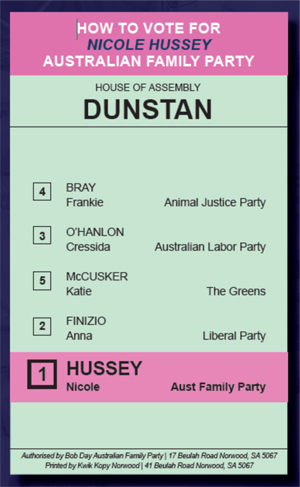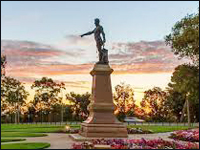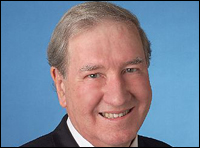 It’s been said that there are only two industries in the world – farming and mining. The rest are jobs.
It’s been said that there are only two industries in the world – farming and mining. The rest are jobs.
Everything we use is the result of something being grown or something being mined.
Yet both are constantly maligned by the Left.
‘Australia is just a farm and a mine’, they snarl.
To which we should all respond, ‘Well, we happen to be very good at farming and mining’.
On these pages just a few months ago we celebrated the 50th anniversary of Western Mining’s discovery of the gold, silver, copper and uranium ore body at Olympic Dam in South Australia.
Olympic Dam became one of the State’s most successful projects (and biggest earners!)
At the time of Federation in 1901, South Australia had an influential hand in shaping the new Commonwealth of Australia. For decades after, Adelaide was Australia’s Number 3 city – bigger and more prosperous than either Brisbane or Perth.
Led by Liberal Premier Tom Playford, South Australia prospered.
A grower himself, Playford believed in farming and mining. He also believed in things which flowed from farming and mining. Unsurprisingly, he remained Premier of South Australia for nearly 30 years.
Playford was an advocate for ‘cheap land, cheap power, cheap water, and cheap labour’. Wages might have been lower than in Sydney and Melbourne, but despite the lower pay packets, South Australians’ quality of life and standard of living were higher than their interstate counterparts.
It was an example of genuine competitive federalism – not the pseudo-competitive federalism of today in which state governments try to outdo each other by enticing companies to set up in their states.
He was also not into bread and circuses and would never allow himself to be seduced by grifters.
Like former Labor Premier John Bannon, South Australia’s current Labor Premier Peter Malinauskas is likeable and sincere. He is also equally naïve.
John Bannon was infatuated with Tim Marcus Clark and his State Bank opportunists.
Bannon allowed the bank to invest billions of dollars of South Australian taxpayers’ money in schemes and projects he didn’t understand.
It was all a scam.
I predict the same will happen with the current Premier’s infatuation with so-called ‘green hydrogen’ and all things renewable.
These renewable energy merchants are, in my opinion, nothing more than corporate parasites who go around manipulating the political process in order to extract money from taxpayers and consumers.
They are a curse.
They rake in billions of dollars gaming the system, raising energy prices, impoverishing consumers, destroying jobs, and fleecing taxpayers.
Playford understood all this.
He also knew how unpredictable the world could be and was a great believer in being self-sufficient – at both a personal and at a State level.
In 1946, he established the Electricity Trust of South Australia (ETSA) and in 1960 built the Port Augusta power station. By 1970 South Australia was completely self-sufficient for electricity – 24 hours a day, 7 days a week – not reliant like we are today on interstate cables ‘for when the sun don’t shine and the wind don’t blow’!
He also oversaw the construction of the Port Stanvac oil refinery in South Australia which began refining crude oil in 1963!
Since then, almost all of SA’s manufacturing and self-sufficiency industries have been shut down and SA is no longer self-sufficient.
The car industry has gone, the Onkaparinga Woolen Mills have closed, so too Port Stanvac refinery, the Port Augusta power station and countless ASX (Australian Stock Exchange) Top 100 companies – Fauldings, Elders, Normandy Mining, Adsteam, Southcorp and of course, one of the world’s biggest companies, News Ltd – have all left town.
Strategic oil reserves, strategic food reserves, strategic water and power policies … who is talking about these things today?
Sir Tom would turn in his grave.
Speaking of no longer being in the black, SA is to have a by-election in the seat of Black following the resignation of former Liberal leader David Speirs.
During the Dunstan by-election earlier this year, the Australian Family Party supported the Liberal Party with its preference decisions due to David Speirs’ commitment to the values of family, faith and freedom.
In replacing Speirs, the Liberals have elected Vincent Tarzia who is also on the same page in these areas.
Matthew Abraham, who has been covering SA politics for a very long time says, ‘While Labor is well-placed to win Black, Tarzia as leader is focussed and no slacker.’
Abraham says Malinauskas, ‘Is still a vote magnet, but cost of living remains the main issue in Black. This should play in Tarzia’s favour.’
 The Australian Family Party’s candidate in Black is Jonathan Parkin (pictured). A former commercial airline pilot, Jonathan has lived in the electorate for most of his life. Married with two children, he has been involved in a number of community activities, including the Nipper program at the local Seacliff Surf Life Saving Club. More about Jonathan in coming weeks.
The Australian Family Party’s candidate in Black is Jonathan Parkin (pictured). A former commercial airline pilot, Jonathan has lived in the electorate for most of his life. Married with two children, he has been involved in a number of community activities, including the Nipper program at the local Seacliff Surf Life Saving Club. More about Jonathan in coming weeks.
The by-election is on Saturday 16th November, with early voting from Monday 11th November – Friday 15th November.
At the general election in 2022, Black was a ‘3-way contest’ – Labor, Liberal and Greens – with the Greens’ candidate feeding preferences to Labor and no-one preferencing the Liberal Party.
Not this time.
If you would like to help influence the outcome of this by-election, please let us know here (choose Federal Director from the button list). We need volunteers on polling day, and at the early voting centres. If you can volunteer for an hour or two, that would be most helpful.
Also, the cost to run in a by-election – candidate registration, how-to-vote cards, etc., is around $1,500.
If you can make a small contribution to help cover these costs, again this would be greatly appreciated. Please click here.
Thank you for your support.
 It is exactly 50 years since Western Mining first discovered the massive gold, silver, copper and uranium ore body at the aptly-named Olympic Dam in South Australia. A golden anniversary indeed!
It is exactly 50 years since Western Mining first discovered the massive gold, silver, copper and uranium ore body at the aptly-named Olympic Dam in South Australia. A golden anniversary indeed! The story is told of the founder of Dubai, Sheikh Rashid, who, when asked about the future of his country replied:
The story is told of the founder of Dubai, Sheikh Rashid, who, when asked about the future of his country replied: In ‘The Adventure of Silver Blaze’, one of the Sherlock Holmes short stories, Holmes is sent to investigate the disappearance – on the eve of an important race – of a champion racehorse called Silver Blaze, and the death of its trainer John Straker.
In ‘The Adventure of Silver Blaze’, one of the Sherlock Holmes short stories, Holmes is sent to investigate the disappearance – on the eve of an important race – of a champion racehorse called Silver Blaze, and the death of its trainer John Straker. Well, both men are now gone, the Liberal Party having lost both State and Federal elections in 2022.
Well, both men are now gone, the Liberal Party having lost both State and Federal elections in 2022. We are all familiar with the story of Jesus overturning the trading tables and driving out the moneychangers from the temple.
We are all familiar with the story of Jesus overturning the trading tables and driving out the moneychangers from the temple.
 In our Newsletters this year we have covered everything from the Voice bomb to the atom bomb, from Israel to industrial relations, from Gough to the Gulags, from federalism to forgiveness, from taxation to Truman, and from housing to Hamlet – and a whole lot more in between.
In our Newsletters this year we have covered everything from the Voice bomb to the atom bomb, from Israel to industrial relations, from Gough to the Gulags, from federalism to forgiveness, from taxation to Truman, and from housing to Hamlet – and a whole lot more in between. On 1 July 2014, my first day as a Senator, Adelaide’s Advertiser newspaper published an opinion piece I had submitted titled, Shedding the ‘Bludger State’ tag, in which I implored the SA State Government to stop bludging on the other states and start standing on its own two feet.
On 1 July 2014, my first day as a Senator, Adelaide’s Advertiser newspaper published an opinion piece I had submitted titled, Shedding the ‘Bludger State’ tag, in which I implored the SA State Government to stop bludging on the other states and start standing on its own two feet. On the 14th of August, Prime Minister Anthony Albanese was interviewed by Neil Mitchell on Melbourne’s 3AW. Part of the interview went like this:
On the 14th of August, Prime Minister Anthony Albanese was interviewed by Neil Mitchell on Melbourne’s 3AW. Part of the interview went like this: Andrew Evans was elected to the South Australian Parliament’s Upper House (Legislative Council) in February 2002 with a primary vote of 4.0%. Not bad for a first-time candidate and a new party.
Andrew Evans was elected to the South Australian Parliament’s Upper House (Legislative Council) in February 2002 with a primary vote of 4.0%. Not bad for a first-time candidate and a new party. One of Abraham Lincoln’s favorite riddles goes like this:
One of Abraham Lincoln’s favorite riddles goes like this: